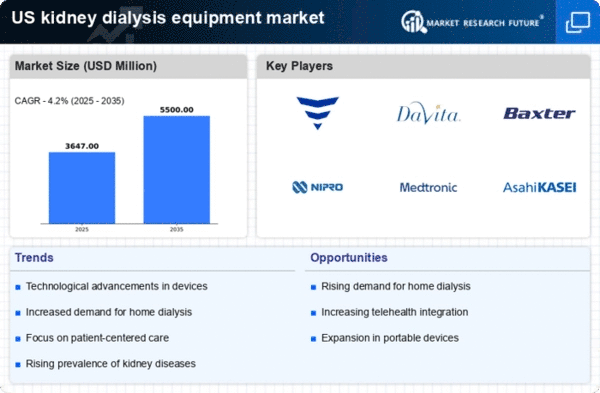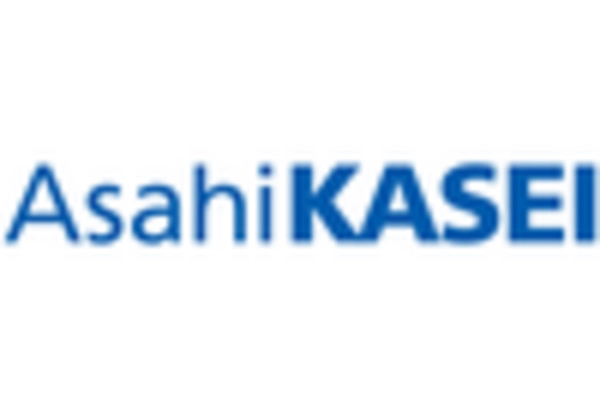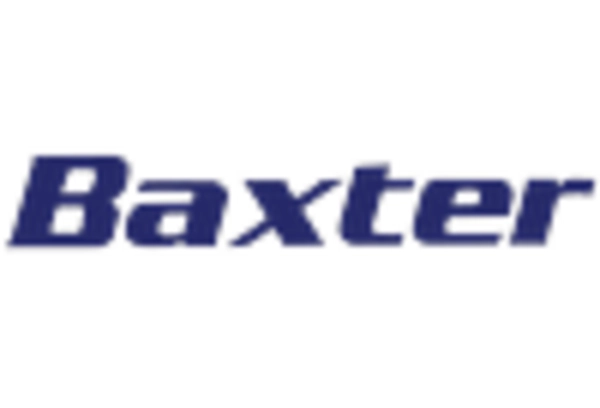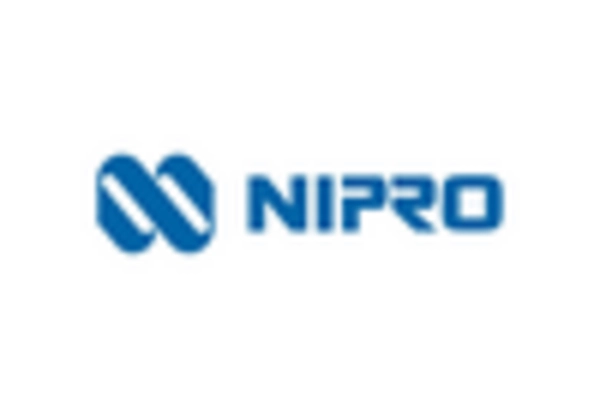Increased Healthcare Expenditure
Healthcare expenditure in the US has been on an upward trajectory, which significantly impacts the kidney dialysis-equipment market. The National Health Expenditure Accounts (NHEA) indicate that total healthcare spending reached approximately $4.3 trillion in 2021, with projections suggesting continued growth. This increase in spending allows for greater investment in medical technologies, including dialysis equipment. As healthcare providers seek to improve patient outcomes and operational efficiencies, the demand for state-of-the-art dialysis machines is likely to rise. Additionally, the expansion of insurance coverage for dialysis treatments further supports market growth, as more patients gain access to necessary care. Consequently, the kidney dialysis-equipment market stands to benefit from this favorable financial environment.
Rising Prevalence of Kidney Diseases
The increasing incidence of chronic kidney diseases (CKD) in the US is a primary driver for the kidney dialysis-equipment market. According to the Centers for Disease Control and Prevention (CDC), approximately 15% of adults in the US are estimated to have CKD, which translates to around 37 million individuals. This growing patient population necessitates enhanced dialysis services and equipment, thereby propelling market demand. Furthermore, the aging population, which is more susceptible to kidney-related ailments, is expected to contribute to this trend. As the healthcare system adapts to accommodate these needs, investments in advanced dialysis technologies are likely to rise, further stimulating the kidney dialysis-equipment market. The interplay between rising disease prevalence and technological innovation suggests a robust growth trajectory for the industry.
Regulatory Support for Dialysis Services
Regulatory frameworks in the US are increasingly supportive of dialysis services, which positively influences the kidney dialysis-equipment market. The Centers for Medicare & Medicaid Services (CMS) has implemented various policies aimed at improving access to dialysis care, including reimbursement models that incentivize quality care. These regulations not only enhance the financial viability of dialysis providers but also encourage the adoption of advanced equipment and technologies. As regulatory bodies continue to prioritize kidney health, the market is likely to see increased investment in dialysis infrastructure and equipment. This supportive regulatory environment is crucial for fostering growth and innovation within the kidney dialysis-equipment market.
Technological Innovations in Dialysis Equipment
Technological advancements in dialysis equipment are transforming the kidney dialysis-equipment market. Innovations such as portable dialysis machines, automated systems, and improved filtration technologies enhance patient comfort and treatment efficacy. The introduction of home dialysis options has also gained traction, allowing patients to manage their treatment in a familiar environment. According to industry reports, the market for home dialysis equipment is projected to grow at a CAGR of over 8% through 2027. These advancements not only improve patient outcomes but also reduce the burden on healthcare facilities. As manufacturers continue to invest in research and development, the kidney dialysis-equipment market is likely to experience sustained growth driven by these innovations.
Growing Awareness and Education on Kidney Health
There is a notable increase in awareness and education regarding kidney health among the US population, which serves as a catalyst for the kidney dialysis-equipment market. Public health campaigns and initiatives by organizations such as the National Kidney Foundation aim to educate individuals about the risks of kidney disease and the importance of early detection. This heightened awareness encourages individuals to seek medical advice and undergo regular screenings, leading to earlier diagnoses and, consequently, a higher demand for dialysis treatments. As more patients become informed about their health, the kidney dialysis-equipment market is expected to expand, driven by the need for effective treatment solutions.
















